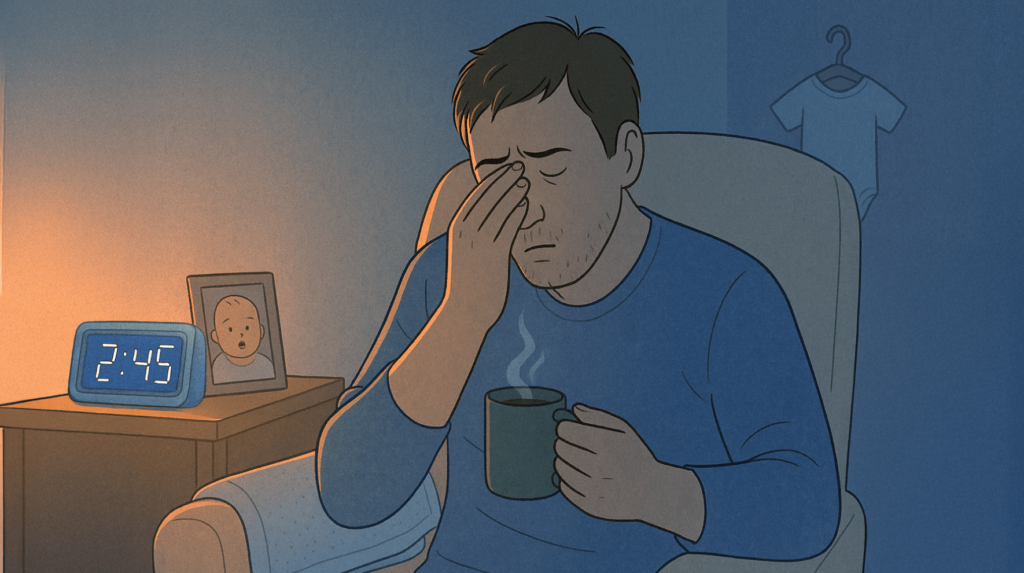Parent brain fog is real, and it’s not just because you’re tired. In honor of Self-Care Awareness Month, we sat down with pediatrician and behavioral sleep coach Dr. Nilong Vyas, MD, MPH. Dr. Nilong is a board-certified pediatrician and sleep consultant with vast experience helping families create healthy sleep habits. As the founder of Sleepless in NOLA, Dr. Vyas combines her medical expertise with a compassionate, parent-first approach to unpack:
- What sleep fragmentation actually does to your brain
- Why new parents feel so foggy and irritable
- Whether your brain ever goes back to “normal”
- How to protect your emotional and mental health, even with a newborn who wakes up often
Why we’re talking about this
September is Self-Care Awareness Month, and while the internet is full of advice about bubble baths and spa days, self-care for new parents often looks a little different. It’s about getting through each day with enough mental clarity, emotional regulation, and patience to care for your little one, and yourself.
One of the biggest obstacles is sleep fragmentation. Even if you manage to get six or seven total hours of sleep, waking up every 90 minutes for feeds, diaper changes, or soothing keeps your brain from fully resting.
To help you understand what’s really happening inside your brain, and what you can do about it, we spoke with Dr. Nilong Vyas.
Q: What is sleep fragmentation, and how is it different from just being sleep-deprived?
Sleep fragmentation, also known as “broken sleep,” refers to repeated awakenings or brief arousals during the night that disrupt the sleep cycle, even when the total hours slept seem adequate. These interruptions prevent your brain from entering the deep, restorative stages of sleep needed for memory, mood regulation, and physical restoration.
“ Sleep fragmentation happens when a person wakes up multiple times during the night, disrupting solid and consistent sleep, which can lead to sleep deprivation.”
Think of sleep fragmentation as getting a movie interrupted every 10 minutes. You technically watch the whole film but never experience the flow or the emotional payoff. Your brain craves full sleep cycles (about 90 minutes each) to repair itself, consolidate memory, and regulate hormones.
For new parents, fragmented sleep often feels like you’re running on autopilot, awake, but not really alert.
Q: How does fragmented sleep affect the brain?
“ When a brain experiences fragmented sleep, where an entire sleep cycle is disrupted, it can lead to feelings of grogginess or irritability the following day. In such cases, the brain is unable to complete the necessary processes required for self-cleaning and performing its functions effectively.”
Translation? Your brain isn’t just tired; it’s overloaded. Key processes like flushing out toxins, consolidating memories, and regulating emotions get disrupted. This is why new parents often feel more forgetful, reactive, or even physically clumsy.
Q: Is it true that new parent brains are “rewired” by sleep loss?
“ New parents commonly experience sleep loss, leading to feelings of brain fog and increased fatigue. The neuroplasticity, or rewiring of the brain, that occurs in new parents is primarily attributed to hormonal shifts resulting from pregnancy and the caregiving process for both mothers and fathers. While caring for a newborn can lead to sleep deprivation, this lack of sleep can intensify the effects of the brain’s rewiring process.”
This rewiring isn’t all bad; your brain is becoming hyper-focused on protecting and bonding with your baby. But the added stress of fragmented sleep can make that adaptation feel overwhelming, amplifying emotional ups and downs.
Q: How long does it take for a parent’s brain to recover from sleep fragmentation?
“ Once parents consistently sleep through the night for several days, their feelings of brain fog, fatigue, and grogginess should resolve, returning them to their pre-deprivation state.”
The good news? The brain is resilient. As soon as you start getting longer stretches of sleep, whether that’s when your baby begins sleeping through the night or when you can rotate night duties with a partner, you’ll notice a difference in energy, clarity, and mood.
Q: What can parents do to protect their brain health in the newborn phase?
“ The best way for parents to protect their brain health during the newborn period is to help the baby sleep well from the start and to rotate caregivers, if possible.”
Here are some practical ways to implement Dr. Vyas’s advice:
- Build a realistic sleep plan early to support better sleep habits for your baby.
- Take shifts with a partner or trusted caregiver so both parents can get at least one uninterrupted stretch of sleep.
- Prioritize micro-rests like short naps during the day; these can add up and help your brain function better.
- Ask for help, from family, friends, or even a postpartum doula.
Remember: self-care during Self-Care Awareness Month isn’t just about treats; it’s about protecting your mental and emotional health for the long haul.
Q: Does fragmented sleep affect emotional health?
“ Fragmented sleep can significantly impact emotional health, potentially leading parents to experience depression, agitation, or even suicidal thoughts. Therefore, it’s crucial for parents to learn how to care for their newborns in a way that promotes good quality sleep. This includes teaching the child to sleep through the night as soon as they are developmentally ready.”
If you feel persistently sad, anxious, or hopeless, it’s essential to seek support immediately. Sleep deprivation isn’t just an inconvenience; it can be a serious health issue.
Self-care tips for new parents
Taking care of yourself isn’t selfish; it’s survival. Here are a few ways to practice real, doable self-care in the newborn phase:
- Nap without guilt – Even a 20-minute power nap can reset your mood and focus.
- Tag-team nights – If possible, alternate feedings with your partner or a helper to get one solid stretch of sleep.
- Prep easy snacks – Keep healthy, grab-and-go options nearby for those nonstop days.
- Move a little – A short walk or gentle stretch can release stress and boost your energy.
- Say yes to help – Whether it’s a home-cooked meal or someone holding the baby while you shower, accept support when it’s offered.
- Check in with yourself – If you’re feeling persistently anxious, sad, or overwhelmed, talk with your doctor or a trusted friend.
Remember: Self-care doesn’t have to be elaborate. It’s about giving your mind and body small moments to recharge, because a cared-for parent is a better-supported baby.

